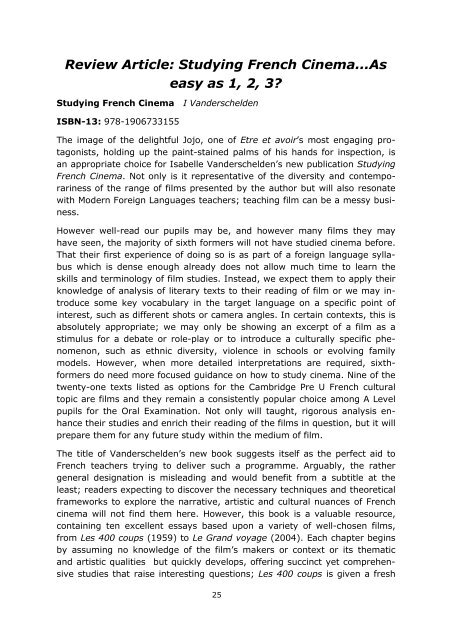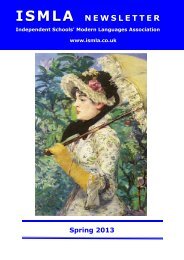Summer 2013 - The Independent Schools' Modern Language ...
Summer 2013 - The Independent Schools' Modern Language ...
Summer 2013 - The Independent Schools' Modern Language ...
Create successful ePaper yourself
Turn your PDF publications into a flip-book with our unique Google optimized e-Paper software.
Review Article: Studying French Cinema...As<br />
Studying French Cinema I Vanderschelden<br />
ISBN-13: 978-1906733155<br />
easy as 1, 2, 3?<br />
<strong>The</strong> image of the delightful Jojo, one of Etre et avoir’s most engaging protagonists,<br />
holding up the paint-stained palms of his hands for inspection, is<br />
an appropriate choice for Isabelle Vanderschelden’s new publication Studying<br />
French Cinema. Not only is it representative of the diversity and contemporariness<br />
of the range of films presented by the author but will also resonate<br />
with <strong>Modern</strong> Foreign <strong>Language</strong>s teachers; teaching film can be a messy business.<br />
However well-read our pupils may be, and however many films they may<br />
have seen, the majority of sixth formers will not have studied cinema before.<br />
That their first experience of doing so is as part of a foreign language syllabus<br />
which is dense enough already does not allow much time to learn the<br />
skills and terminology of film studies. Instead, we expect them to apply their<br />
knowledge of analysis of literary texts to their reading of film or we may introduce<br />
some key vocabulary in the target language on a specific point of<br />
interest, such as different shots or camera angles. In certain contexts, this is<br />
absolutely appropriate; we may only be showing an excerpt of a film as a<br />
stimulus for a debate or role-play or to introduce a culturally specific phenomenon,<br />
such as ethnic diversity, violence in schools or evolving family<br />
models. However, when more detailed interpretations are required, sixthformers<br />
do need more focused guidance on how to study cinema. Nine of the<br />
twenty-one texts listed as options for the Cambridge Pre U French cultural<br />
topic are films and they remain a consistently popular choice among A Level<br />
pupils for the Oral Examination. Not only will taught, rigorous analysis enhance<br />
their studies and enrich their reading of the films in question, but it will<br />
prepare them for any future study within the medium of film.<br />
<strong>The</strong> title of Vanderschelden’s new book suggests itself as the perfect aid to<br />
French teachers trying to deliver such a programme. Arguably, the rather<br />
general designation is misleading and would benefit from a subtitle at the<br />
least; readers expecting to discover the necessary techniques and theoretical<br />
frameworks to explore the narrative, artistic and cultural nuances of French<br />
cinema will not find them here. However, this book is a valuable resource,<br />
containing ten excellent essays based upon a variety of well-chosen films,<br />
from Les 400 coups (1959) to Le Grand voyage (2004). Each chapter begins<br />
by assuming no knowledge of the film’s makers or context or its thematic<br />
and artistic qualities but quickly develops, offering succinct yet comprehensive<br />
studies that raise interesting questions; Les 400 coups is given a fresh<br />
25



